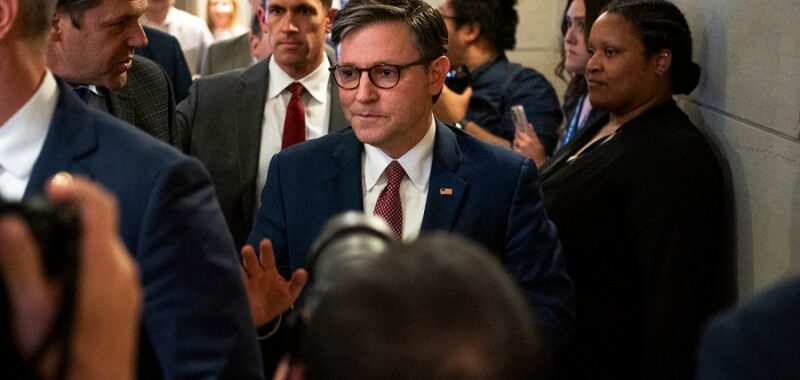
A late-night meeting between Speaker Mike Johnson (R-La.) and moderate Republicans fighting for an obscure tax break ended with no deal on Monday, prolonging the fight over an issue that’s emerged as one of the major barriers to a final agreement on President Trump’s domestic agenda.
“We had some questions, they have to wait for some more scores now,” Rep. Andrew Garbarino (R-N.Y.) said. “They’re hoping to have some numbers back to us by morning.”
The moderate lawmakers are seeking a significant hike to the ceiling on the state and local tax (SALT) deduction, which was capped at $10,000 as part of the Republicans’ 2017 tax law. The cap was designed to prevent wealthy taxpayers from getting a huge break, but the critics say it’s also hitting middle-class taxpayers in high-income, high-tax states like New York, New Jersey and California.
The high-tax state moderates oppose the $30,000 cap included in the Republicans’ initial package, which passed through the Budget Committee on Sunday night. They’re pressing Johnson to increase the figure as part of changes expected to be taken up by the Rules Committee at 1 a.m. on Wednesday.
Emerging from the meeting in Johnson’s office, which began at 10 p.m., SALT Caucus members said leadership has offered them several proposals, and now they’re waiting on several scorekeepers — the Congressional Budget Office and Joint Committee on Taxation — to provide estimates.
Complicating the decision for Johnson are conservative spending hawks who are threatening to oppose any hike in the SALT cap that isn’t completely offset by changes elsewhere in the budget — pressure the moderates are quick to acknowledge.
“The Speaker’s doing everything he can to try to get us to yes,” Garbarino said. “There’s a lot of pressure coming to him from the other side.”
One idea that has been floated throughout talks — according to two sources familiar with the deliberations — is a two-part plan that would increase the deduction cap from the current $30,000 proposal to a higher number for a shorter period of time, then decrease the deduction cap after that window expires.
The strategy is designed to appease conservative spending hawks seeking to lower the cost of the package, while also providing SALT Caucus members a political win for their districts with a higher — albeit temporary — deduction cap.
It remains unclear what the deduction caps and timeline would be, how seriously leadership is considering such a proposal, or if members of the SALT Caucus would accept the framework.
Both sides said the talks will continue Tuesday as GOP leaders race for an agreement on President Trump’s domestic agenda. Trump will also enter the fray on Tuesday when he visits the Capitol to huddle with the House GOP conference, where he’s expected to urge the holdouts to drop their reservations and rally behind the bill.
Leaving Monday’s meeting, Johnson offered no details about the leadership offers. But he said the House remains on track to pass the legislation before Memorial Day.
“Lots of progress,” Johnson said.
The SALT debate has become one of the thorniest sticking points gumming up progress on the GOP’s “big, beautiful bill,” as moderate Republicans from high-tax blue states push for a higher deduction cap, and hardline conservatives demand any increase be paid for.
Leadership initially proposed a $30,000 deduction cap — up from the current $10,000 cap — for individuals making $400,000 or less, a number that key stakeholders rejected. Instead, members of the SALT Caucus floated a $62,000 deduction cap for single filers and a $124,000 cap for joint filers — highlighting the gulf between the two camps.

